Plastic recycling is a critical pillar in achieving a circular economy. Component 4 of the project focuses on strengthening the plastic recycling ecosystem in Bangladesh through technical support, enterprise development, and the formalization of informal actors. It seeks to ensure that plastic waste, especially low-value single-use plastics, is not discarded but instead becomes a valuable input for local industries, contributing to both environmental sustainability and green livelihoods.
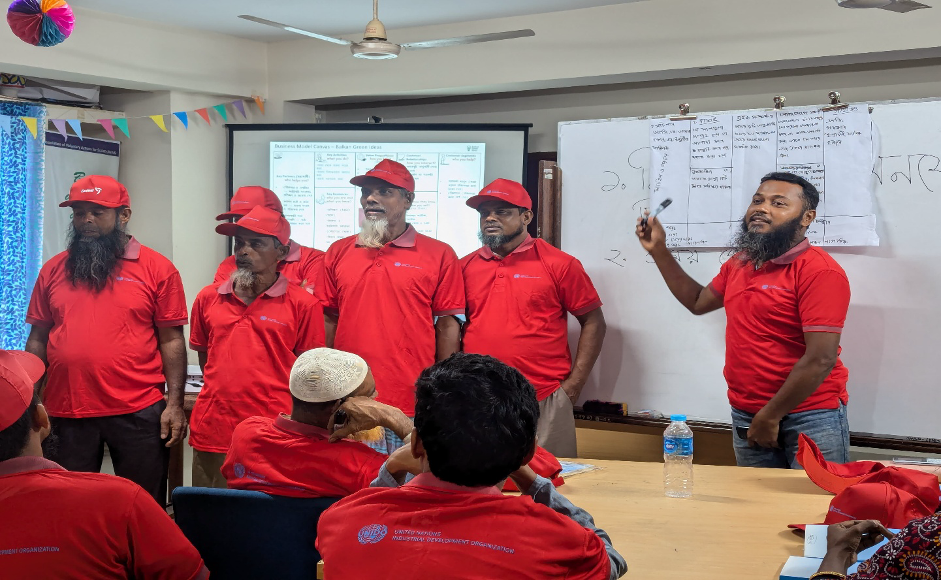
Building Capacity Across the Recycling Chain
Recognizing that a large part of Bangladesh’s recycling is handled by informal actors, the project launched specialized training programs for waste collectors, sorters, aggregators, and small recycling enterprises. These trainings are not just technical, they’re transformational.
Participants were trained in:
• Safe sorting and handling of plastic waste
• Use of personal protective equipment (PPE)
• Categorization and value-based separation of plastics
• Business skills such as pricing, negotiation, and inventory tracking
• Health, hygiene, and workplace safety
• Environmental compliance and documentation
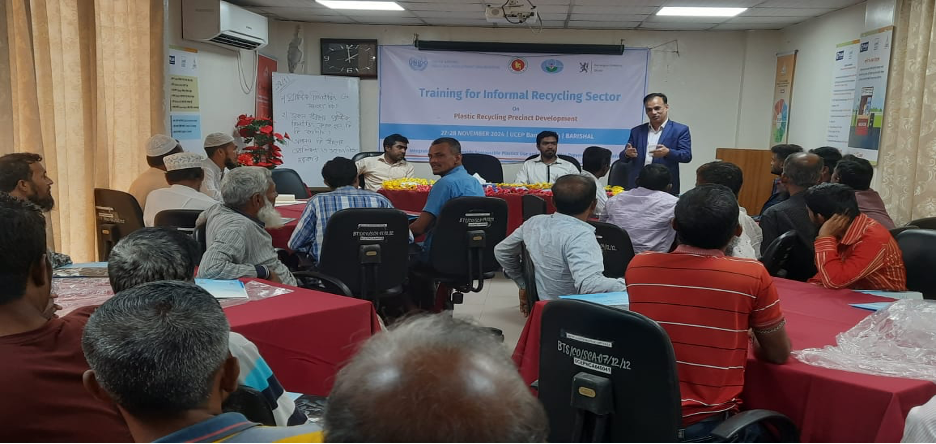
More than 150 waste workers and recyclers—nearly half of them women—have received this training under the project. By equipping them with knowledge, tools, and safety practices, the initiative has enhanced both their productivity and dignity. Several of these workers are now connected to formal recycling businesses, cooperatives, and new income streams.
From Waste to Worth: Rina’s Quiet Revolution in Barisal
One of the most compelling success stories from this component is Nazmun Naher Rina, a female entrepreneur who leads Bismillah Polymer, a recycling unit in Barisal that transforms the lowest-grade plastic waste—poly bags, snack wrappers, discarded packaging—into durable black polymer sheets used in roofing and flood-resilient construction.
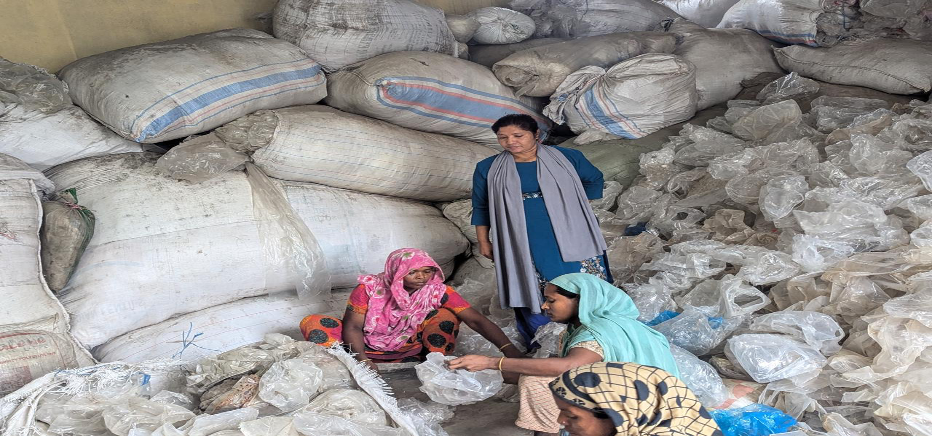
With support from the project, Rina received:
• Technical guidance and cleaner technology
• Business mentoring
• Upgraded machinery
• An Environmental Management Plan (EMP) to ensure sustainable operations
Her factory now processes up to 1.2 tons of plastic per day. Just as important, she has created a safe, respectful workplace where many of her suppliers and workers are women who formerly worked in unrecognized, informal roles. Rina has installed shaded rest areas, ensured safety equipment is used, and created a sense of ownership among her team. “It’s not just about recycling anymore,” she says. “It’s about rewriting what people think a woman can do.”
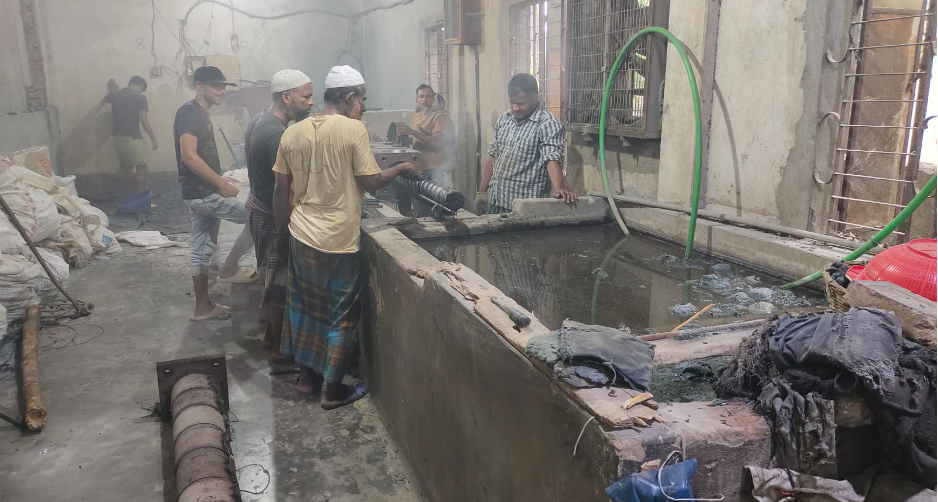
The Recycling Precinct Model: Structured Circularity
In Barisal, the project is piloting a Recycling Precinct Model—a localized industrial ecosystem that connects plastic collectors, sorters, processors, and product manufacturers. This model:
• Reduces waste transportation and processing costs
• Creates value chains from collection to end-product
• Promotes quality control and traceability
• Encourages cluster-based enterprise development
This model is designed for replication across other cities, creating scalable hubs for green industry, waste reduction, and job creation.
Cleantech Acceleration and Commercialization Program
To further foster innovation in the recycling industry, the project launched the Cleantech Acceleration and Commercialization Program in partnership with SME Foundation. This national-level initiative is designed to support students, startups, recycling entrepreneurs, and innovators with impactful ideas for sustainable plastics management.
Key features of the program include:
• Capacity building and mentorship from industry experts
• Prototype development and technical support
• Investor matchmaking and commercialization pathways
• A national competition to spotlight scalable cleantech solutions
Finalists from the accelerator program will gain visibility, market access, and potential funding support—transforming local recycling challenges into business opportunities and innovation-led impact.
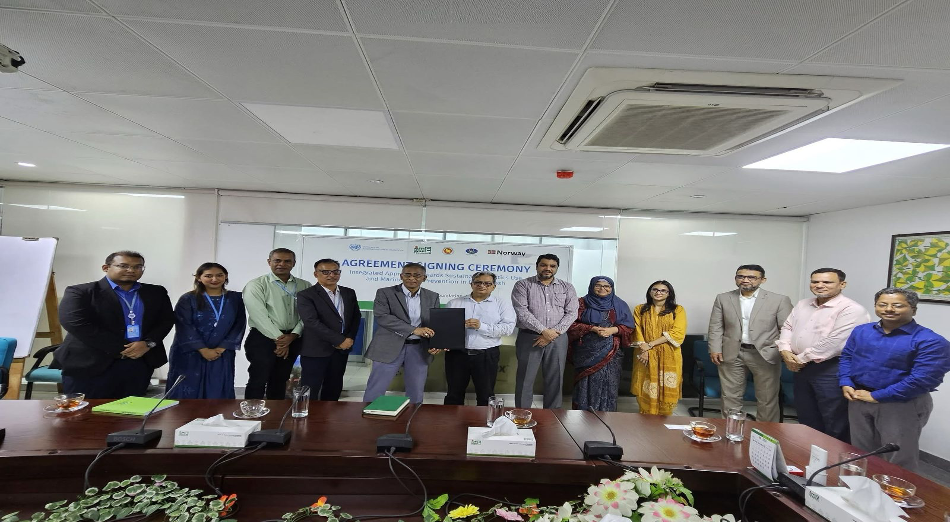
This initiative helps strengthen the recycling sector not only with infrastructure, but with forward-thinking entrepreneurs who can lead the shift toward circular business models.
Gender Inclusion at Every Step
Component 4 ensures that women are active participants and leaders in the recycling ecosystem—from informal waste collectors to facility owners. This is not accidental—trainings were designed with gender-sensitive approaches, including:
• Safe, inclusive training environments
• Leadership development opportunities
• Networking support for women recyclers
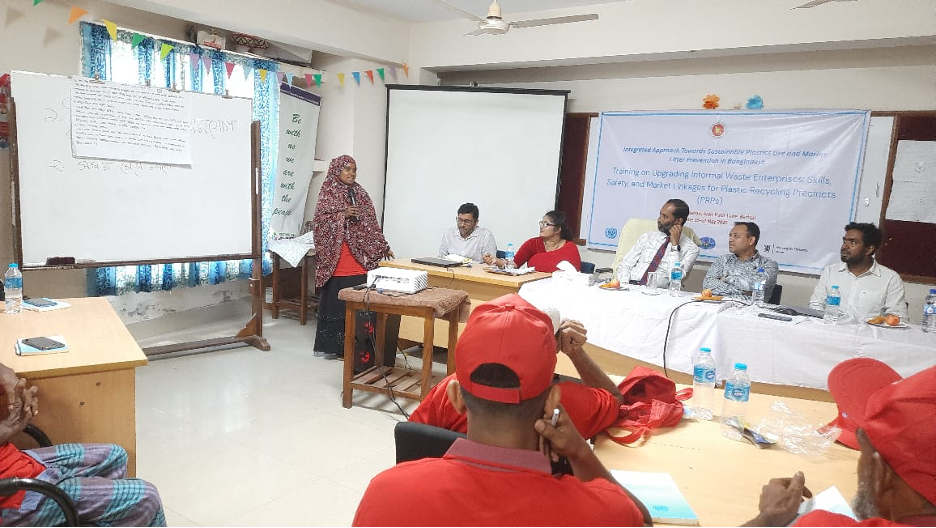
Women like Rina now mentor others, helping build a new generation of female-led green entrepreneurs.
Green Products with Local Impact
The products created by recyclers under this component, such as polymer sheets, plastic tiles, and waterproofing materials—are now being used by NGOs and local contractors. These recycled goods support climate-resilient construction and reduce dependency on virgin plastic.
The project has also supported enterprises with branding, product development, and connection to markets—turning what was once considered waste into climate-smart, income-generating solutions.
Conclusion: Recycling as an Engine of Green Growth
Component 4 demonstrates that with the right support, the recycling sector in Bangladesh can be inclusive, innovative, and economically viable. It not only diverts plastic from the environment but also creates jobs, empowers women, and contributes to a greener economy. From informal waste workers to entrepreneurs like Rina, the component exemplifies how waste—when handled right—can become worth.
Upcoming Events
Patharghata Clean-up Event
- 11 Dec, 2025
- Patharghata
- Register Now
Barguna Sadar Clean-up Event
- 10 Dec, 2025
- Barguna Sadar
- Register Now
Pirojpur Cleanup
Every cleanup starts with someone willing to take the first step. By registering as a Community Leader, you’re not just signing up for an event — you’re committing to be part of a growing mov...
- 22 Sep, 2025
- Pirojpur, Bangladesh
- Register Now